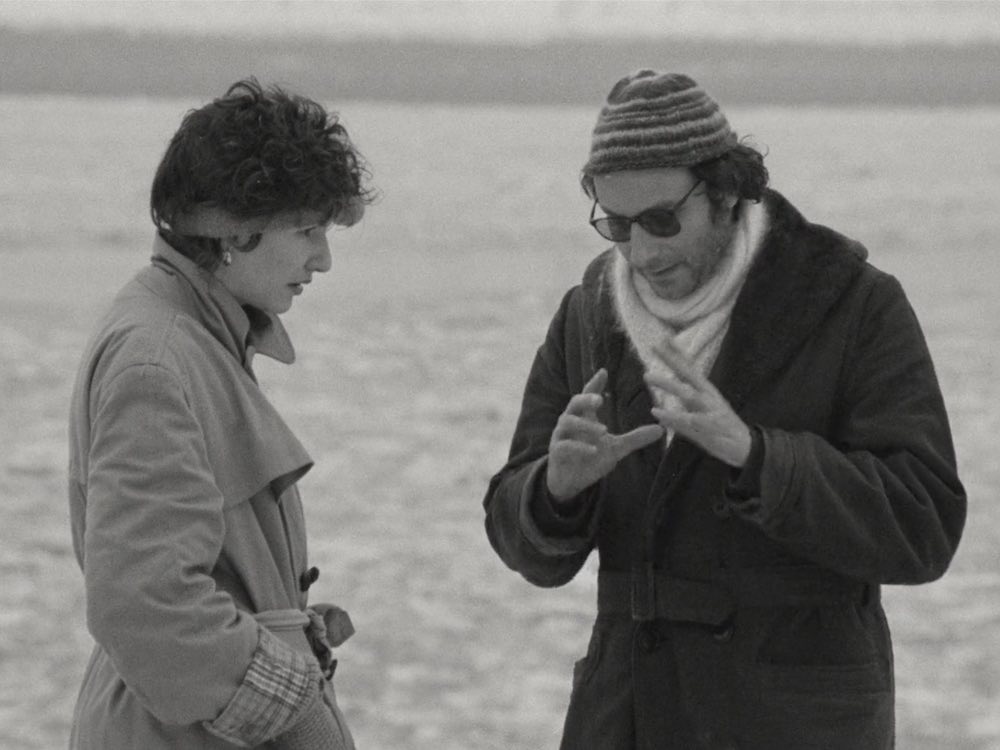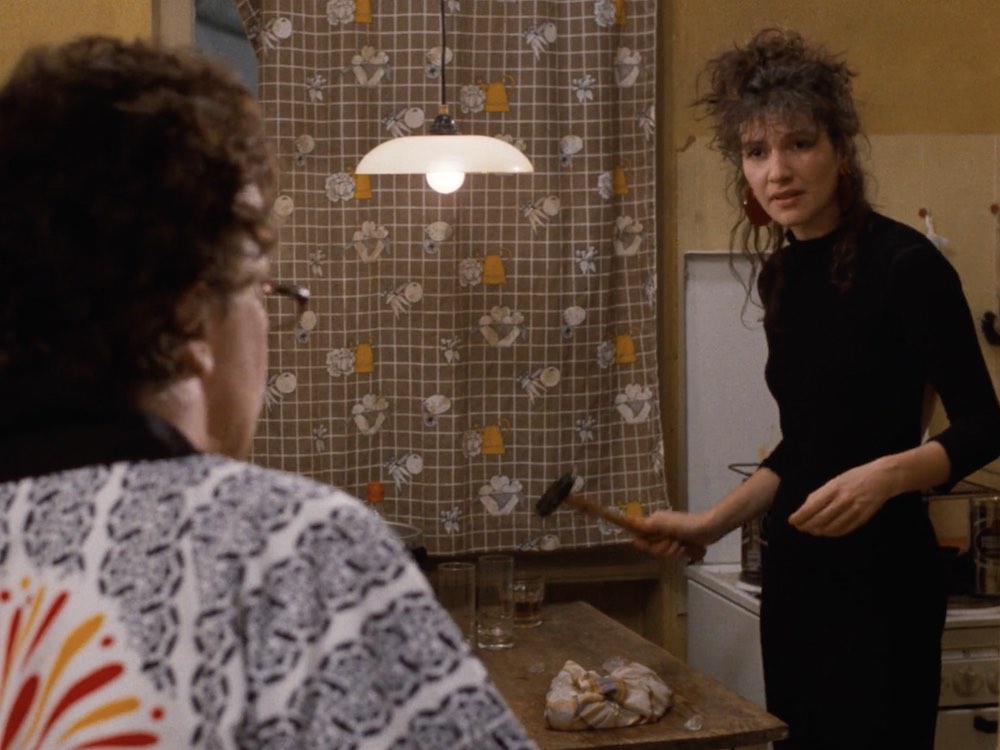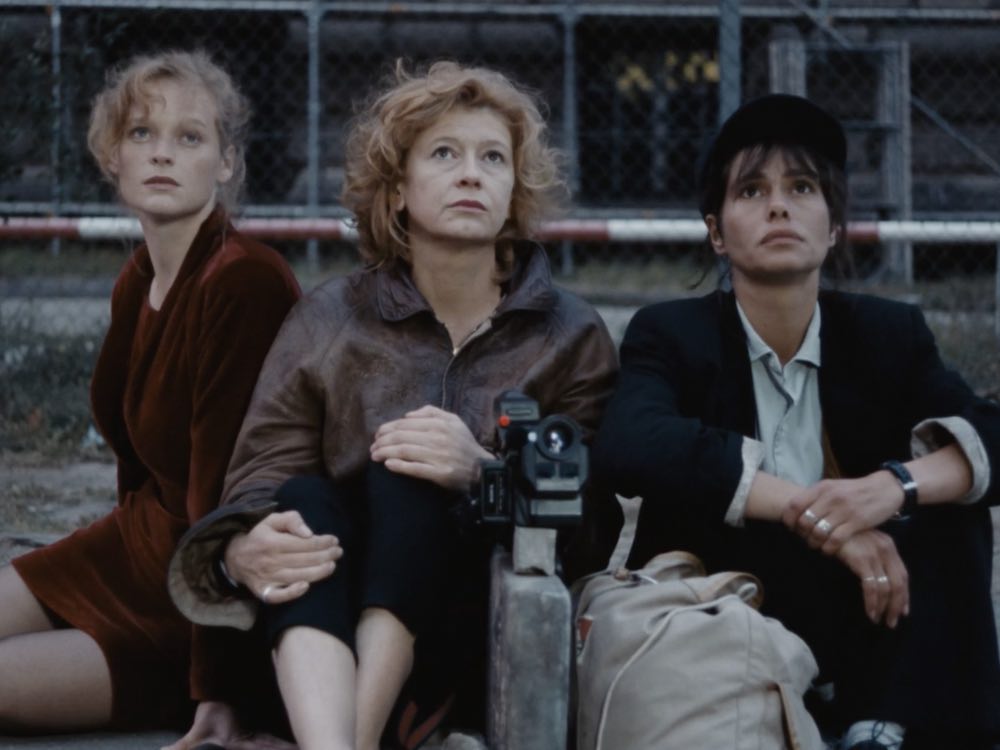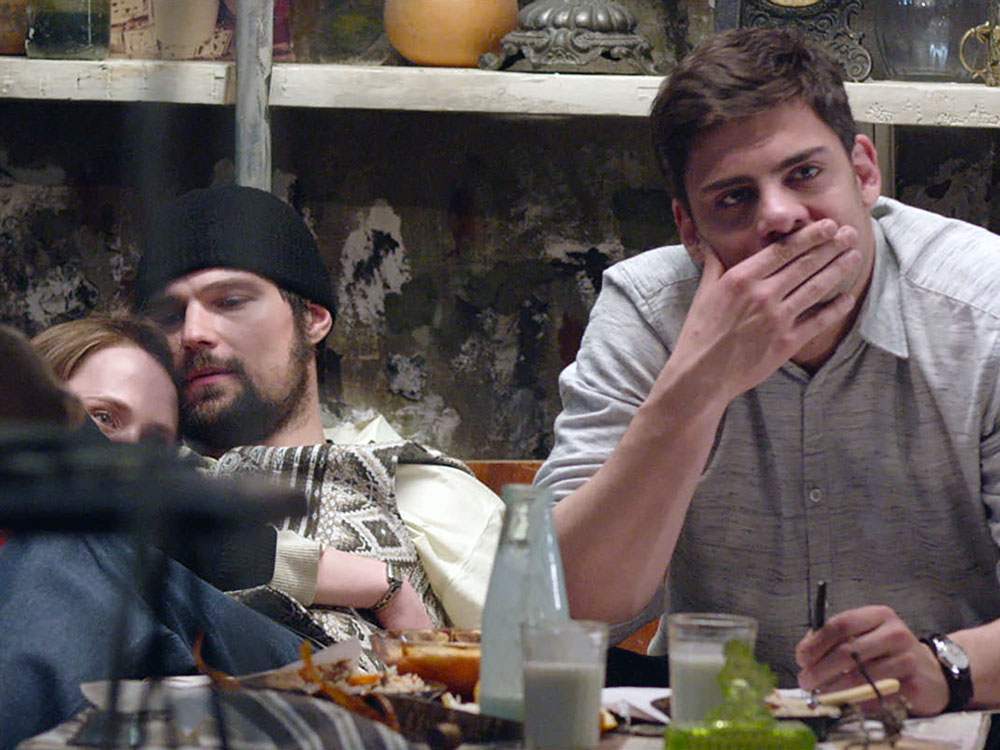19 - 23 September 2025

Pia Frankenberg began writing and directing films soon after assisting on Ulrike Ottinger’s Freak Orlando (1981). Over the next eleven years, before leaving Germany for America and writing novels, she made three features and two shorts.
Her films are animated by contagiously impulsive women, most of whom abandon bourgeois happiness and pursue the romance of new, improvised futures. Frankenberg complements her characters’ irreverence towards societal norms with wayward narrative arcs, and does not only write and direct these women. Often, she takes to centre-screen too. Her charming performances of fidgety, privileged women – who might go against the grain for less than radical reasons – wink at audiences with wry self-deprecation.
Frankenberg did not fit into an aesthetic or political movement. She had affection for Wim Wenders’s films – which, like her own, set odd couples in unpredictable motion – and also worked with actors and cinematographers who had collaborated with the likes of Fassbinder and Herzog. But she was born a touch too late for the New German Cinema, coming to filmmaking when the movement had come to an end.
She was younger, too, than explicitly feminist filmmakers such as Helke Sander and Margarethe von Trotta by fifteen to twenty years. She never appeared in the pages of Frauen und Film – a feminist journal that surfaces in Frankenberg’s Ain’t Nothin’ Without You (1985), where one character says of feminist aesthetics, “They do go on about it, don’t they.” However curious she was about feminism, Frankenberg was ambivalent about art that started from a fixed idea.
She liked jazzy spontaneity; what was important for her was the spirit of the moment. As such, Frankenberg was never closed off to social realities. Whether immigration, housing, or the long hold of ’68 on the popular imagination, her 1980s comedies are capacious enough to accommodate the world alongside personal neuroses and dramas. While these films are set in Hamburg, Never Sleep Again (1992) takes place in reunified Berlin, following three women searching for excitement (or something different, at least, to whatever book, film, or song is being discussed that week among their friends back home). Here Frankenberg continues to swerve from the path most often taken, and opens up to the world once more: her final film doubles as a documentary of a city under construction, as Berlin redefines its relationship to history after the fall of the Wall.
Each film in this comprehensive retrospective of Frankenberg’s work screens in a 4K restoration, apart from The Assault (1983), which will play on an imported print. Opening night begins with an introduction from the season curator, and new writing on Frankenberg – commissioned for this focus – accompanies Never Sleep Again.

Pia Frankenberg began writing and directing films soon after assisting on Ulrike Ottinger’s Freak Orlando (1981). Over the next eleven years, before leaving Germany for America and writing novels, she made three features and two shorts.
Her films are animated by contagiously impulsive women, most of whom abandon bourgeois happiness and pursue the romance of new, improvised futures. Frankenberg complements her characters’ irreverence towards societal norms with wayward narrative arcs, and does not only write and direct these women. Often, she takes to centre-screen too. Her charming performances of fidgety, privileged women – who might go against the grain for less than radical reasons – wink at audiences with wry self-deprecation.
Frankenberg did not fit into an aesthetic or political movement. She had affection for Wim Wenders’s films – which, like her own, set odd couples in unpredictable motion – and also worked with actors and cinematographers who had collaborated with the likes of Fassbinder and Herzog. But she was born a touch too late for the New German Cinema, coming to filmmaking when the movement had come to an end.
She was younger, too, than explicitly feminist filmmakers such as Helke Sander and Margarethe von Trotta by fifteen to twenty years. She never appeared in the pages of Frauen und Film – a feminist journal that surfaces in Frankenberg’s Ain’t Nothin’ Without You (1985), where one character says of feminist aesthetics, “They do go on about it, don’t they.” However curious she was about feminism, Frankenberg was ambivalent about art that started from a fixed idea.
She liked jazzy spontaneity; what was important for her was the spirit of the moment. As such, Frankenberg was never closed off to social realities. Whether immigration, housing, or the long hold of ’68 on the popular imagination, her 1980s comedies are capacious enough to accommodate the world alongside personal neuroses and dramas. While these films are set in Hamburg, Never Sleep Again (1992) takes place in reunified Berlin, following three women searching for excitement (or something different, at least, to whatever book, film, or song is being discussed that week among their friends back home). Here Frankenberg continues to swerve from the path most often taken, and opens up to the world once more: her final film doubles as a documentary of a city under construction, as Berlin redefines its relationship to history after the fall of the Wall.
Each film in this comprehensive retrospective of Frankenberg’s work screens in a 4K restoration, apart from The Assault (1983), which will play on an imported print. Opening night begins with an introduction from the season curator, and new writing on Frankenberg – commissioned for this focus – accompanies Never Sleep Again.
The focus is curated by writer and editor Laura Staab.
Programme

Friday 19 September, 6.30pm
The Assault on 35mm + Ain't Nothin' Without You (4K Restoration) + Q&A
Pia Frankenberg’s most self-reflexive films include a swift, striking riposte to funding cuts, and a comedy in which a filmmaker reckons with her commitments to the feminist and activist politics of the ’60s and ’70s. Frankenberg stars in both, sparkling with mischief and self-deprecating charm. Followed by an in-person Q&A with Pia Frankenberg.

Sunday 21 September, 6.35pm
Burning Beds (4K Restoration)
Pia Frankenberg takes the screwball for an explosive spin in Hamburg, casting herself alongside punk musician Ian Dury – with whom she also recorded the original soundtrack. French New Wave cinematographer Raoul Coutard lends vital dynamism and colour to this combustible film.

Tuesday 23 September, 8.30pm
Longing for Something Completely Different (4K Restoration)
+ Never Sleep Again (4K Restoration)
Women wander in search of adventure in Pia Frankenberg’s first and final films. Characters board a night train and drive into a newly reunified Berlin, as the writer-director finds forms of romance in female friendship.

Friday 19 September, 6.30pm
The Assault on 35mm + Ain't Nothin' Without You (4K Restoration) + Q&A
Pia Frankenberg’s most self-reflexive films include a swift, striking riposte to funding cuts, and a comedy in which a filmmaker reckons with her commitments to the feminist and activist politics of the ’60s and ’70s. Frankenberg stars in both, sparkling with mischief and self-deprecating charm. Followed by an in-person Q&A with Pia Frankenberg.

Sunday 21 September, 6.35pm
Burning Beds (4K Restoration)
Pia Frankenberg takes the screwball for an explosive spin in Hamburg, casting herself alongside punk musician Ian Dury – with whom she also recorded the original soundtrack. French New Wave cinematographer Raoul Coutard lends vital dynamism and colour to this combustible film.

Tuesday 23 September, 8.30pm
Longing for Something Completely Different (4K Restoration)
+ Never Sleep Again (4K Restoration)
Women wander in search of adventure in Pia Frankenberg’s first and final films. Characters board a night train and drive into a newly reunified Berlin, as the writer-director finds forms of romance in female friendship.










no. 236848.